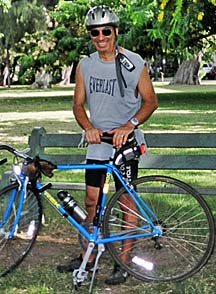Survivor of heart attack
cherishes life
Larry Gambone will be
among the participants in
this year's Heart Walk
Although his father's side of the family had a history of premature deaths from heart disease, Larry Gambone says he was in denial when he had a massive heart attack at age 40.
![]()

![]()
Larry Gambone: He had a heart attack at 40 that required a quintuple bypass
Gambone will be among those wearing red caps at the American Heart Association's annual Honolulu Heart Walk tomorrow at Kapiolani Park to celebrate their survival and honor relatives who died of heart disease.
A New Jersey native, he was working 90 to 100 hours a week at a stressful job with a public accounting firm when he had a heart attack and an unprecedented quintuple bypass procedure.
He said his father died at age 36 from heart disease, but Gambone never thought he would have a heart problem. He was running and biking almost daily and was physically fit.
"In fact, that is what saved my life," he said. "My cardiologist told me because I was in such good physical shape and my heart was so strong, I survived it. I really shouldn't have survived it."
The day before his heart attack, he said he felt terrible after a 5-mile run but thought it was just "a bad day."
"At home, boy, did I get sick. For three days, I couldn't move."
When he felt better, he went to the doctor, thinking he had the flu. When the cardiologist said he needed a bypass, "I was in shock," Gambone said. "I couldn't believe this."
"You can have the operation or you can die," he remembers the doctor saying.
"You have the Gambone curse," a cousin once told him. No one on his father's side of the family had lived past 50. At 5 foot 6 and 150 pounds, Gambone said he never smoked, was not overweight, and his heart was very strong.
Last year, he became ill while playing ultimate Frisbee, and "knew the symptoms." Surgeons placed three stents in his artery. He is fine now, with "good days and bad days."
He continues to be active, with plans to make a routine Saturday bike ride from Kapiolani Park to Makapuu and back after the heart walk with more than 1,300 other Bank of Hawaii employees, who helped raise more than $120,000 for the American Heart Association.
Heart disease caused
More than 3,300 Hawaii residents died of cardiovascular-related diseases last year -- roughly 37 percent of all deaths in the state, according to the American Heart Association. |
E-mail to City Desk
[News] [Business] [Features] [Sports] [Editorial] [Do It Electric!]
[Classified Ads] [Search] [Subscribe] [Info] [Letter to Editor]
[Feedback]
